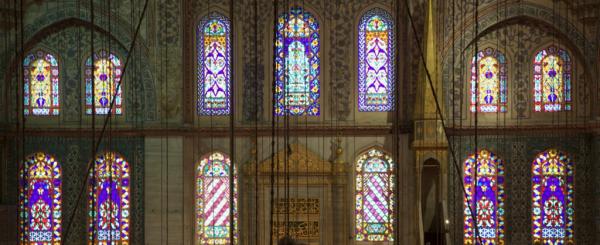PART 16 – THE SUSTENANCE OF A BELIEVER

At the end of time there will be a severe drought (the duration of which varies according to reports) which will cause widespread famine. The only water and food available will be under the control of the Dajjal.
So how will the believers fend for themselves during this horrific time? Rasulullah SAW advised that the sustenance of the believers during this time will be tasbeeh, hamd and tahleel.
Allah can give us strength even from the small things. Like many things in dunia, size and quantity are illusory. The actual physical object may be insignificant, but the blessings in it can be abundant. There are ample reports during the life of Rasulullah SAW about how a portion of food barely enough for two people, or a small container of milk, provided plentiful to dozens who ate or drank to their fill without the original portion diminishing. This is a demonstration of Allah’s bounty or barakah.
We tend to agonize about our rizq. We constantly worry that our wealth will be insufficient for tomorrow, or for our children’s futures. Hasn’t Allah already provided us abundantly so far, whether or not we believe in Him? The believer need not fear that Allah will neglect or forget to provide tomorrow. Allah provides for the different needs of His billions of creations. Allah has neither forgotten nor will forget our needs.
Allah constantly challenges us to contemplate His signs, but the majority of us fail to do so! Allah’s creations, from the level of complexity of the human body, the animal kingdom, weather patterns, ecosystems, the galaxies and the microbes, are still beyond the comprehension of modern science. Such exquisite perfection of nature’s balance, which is still being discovered today and are the continuous subject of intense studies, should increase our awe of the Creator. Even the challenges to contemplate the signs of Allah in the Qur’an can be understood by any layman at face value, because He gives us clear and obvious examples – the clouds, the rain, the bees, the ants, the trees, the seas – all the things around us that we can relate to without being an intellectual elite.
Yet, even with this awareness, we overlook how Allah has nurtured and sustained us all our lives, and we worry about a future that is not even within our control. We still carry deep distrust in Allah when it comes to paving out our own lives.
If we neglect our contemplation, we will disregard the power of Allah, which leads us to neglect thanking Allah. We will forget to be attentive to the basics: that no one can benefit or harm us without the will of Allah. Shaitan makes us forget this and positions us in a state of poverty where we are constantly anxious and emotional.
Signs of disconnection with Allah include fear, anxiety, stress, nervousness and irritability. It can even affect our salat if we cannot enter it in a state of calm and tranquillity. Shaitan will conjure different thoughts and emotions within us, remind us of unimportant matters and play scenarios in our heads, whether real or imaginary, so that we are inattentive during our meeting with Allah.
Rasulullah SAW has mentioned that we will not gain from salat except what we comprehend from it. If, on a bad day, we emerge from salat as angry or vindictive as when we entered it, it indicates a serious disconnect from Allah.
If one abandons Allah, Shaitan will be his constant companion. If we hold tight to the rope with Allah, Allah will tug us back towards the right direction when we stray.
Allah taught us many variations of zikrullah and each of them can give us different strengths for different situations.
With Subhanallah, we remember the wonder and perfection of Allah all the time, and we surrender to Him.
With Alhamdulillah, we recall the blessings of Allah, feel thankful, and will not get upset on the occasions that Allah withholds from us.
Allahu Akbar overrides everything else in this world, including ourselves, worries, burdens and sins. There is nothing greater, and true understanding of this will liberate us from anxiety. By being in a constant state of gratitude, awe and belonging to Allah, we are in the grasp of Allah, close to Him, and beyond any human insult or provocation.
Iman is not the same as academic knowledge. It is reflected in how we behave when tested with situations that we cannot predict or prepare for. It is how we respond when taken by surprise, or jolted by an unpleasant situation.
A lady was walking in the market and tripped over a nail. The passers by were horrified by the extent of her injuries, but she remained calm and smiling. They asked how this could be. She replied that she looked at what happened to her and remembered who caused it to happen. She smiled because she understood that Allah was trying to get her closer to Him. She took the calamity and her bleeding limbs as a gift, and accepted it with gratitude. She did not suffer a meltdown or create a drama. This unknown woman is now legendary in Islamic texts!
‘Ali (RA) related that his wife, Fatimah (RA) (the daughter of Muhammad SAW) complained about the fatigue and pain caused to her by heavy domestic chores. When the Prophet (SAW) heard, he came to them and said:
“Shall I not teach you something better than what you asked for? When you go to your bed, magnify Allah thirty-four times, glorify Him thirty-three times and praise Him thirty-three times. That is better for you than a servant.” [Bukhari and Muslim] It was said that Fatimah RA never felt tired after that.
Tahleel (la Ila ha ilallah) is mentioned 36 times in the Qur’an. It is a fundamental component of our shahadah. If uttered with sincerity, it crystallizes the utter and complete submission and realization that Allah is the owner, controller and creator of everything.
Another form of zikr is zikr bil hau qallah (la hawla wala quwwata ila billah – nothing happens without the will and might of Allah), and this is one of the keys to the treasure of Allah given to the ummah of Muhammad.
Abu Musa (RA) reported that Rasulullah SAW said “Should I not direct you to the words (which form) the treasure of Paradise? I said: “Allah’s Messenger, what are these?” He said:” There is no might and no power but that of Allah.” (Muslim)




